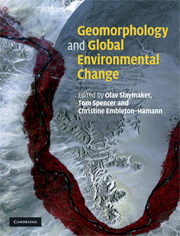Book contents
- Frontmatter
- Contents
- List of contributors
- Preface
- Acknowledgements
- List of acronyms and abbreviations
- 1 Landscape and landscape-scale processes as the unfilled niche in the global environmental change debate: an introduction
- 2 Mountains
- 3 Lakes and lake catchments
- 4 Rivers
- 5 Estuaries, coastal marshes, tidal flats and coastal dunes
- 6 Beaches, cliffs and deltas
- 7 Coral reefs
- 8 Tropical rainforests
- 9 Tropical savannas
- 10 Deserts
- 11 Mediterranean landscapes
- 12 Temperate forests and rangelands
- 13 Tundra and permafrost-dominated taiga
- 14 Ice sheets and ice caps
- 15 Landscape, landscape-scale processes and global environmental change: synthesis and new agendas for the twenty-first century
- Index
1 - Landscape and landscape-scale processes as the unfilled niche in the global environmental change debate: an introduction
Published online by Cambridge University Press: 05 July 2015
- Frontmatter
- Contents
- List of contributors
- Preface
- Acknowledgements
- List of acronyms and abbreviations
- 1 Landscape and landscape-scale processes as the unfilled niche in the global environmental change debate: an introduction
- 2 Mountains
- 3 Lakes and lake catchments
- 4 Rivers
- 5 Estuaries, coastal marshes, tidal flats and coastal dunes
- 6 Beaches, cliffs and deltas
- 7 Coral reefs
- 8 Tropical rainforests
- 9 Tropical savannas
- 10 Deserts
- 11 Mediterranean landscapes
- 12 Temperate forests and rangelands
- 13 Tundra and permafrost-dominated taiga
- 14 Ice sheets and ice caps
- 15 Landscape, landscape-scale processes and global environmental change: synthesis and new agendas for the twenty-first century
- Index
Summary
The context
Whatever one's views, it cannot be doubted that there is a pressing need to respond to the social, economic and intellectual challenges of global environmental change. Much of the debate on these issues has been crystallised around the activities of the IPCC (Intergovernmental Panel on Climate Change). The IPCC process was set up in 1988, a joint initiative between the World Meteorological Organization and the United Nations Environment Programme. The IPCC's First Assessment Report was published in 1990 and thereafter, the Second (1996), the Third (2001) and the Fourth Assessment Report (2007) have appeared at regular intervals. Each succeeding assessment has become more confident in its conclusions.
The conclusions of the Fourth Assessment can be summarised as follows:
(a) warming of the climate system is unequivocal;
(b) the globally averaged net effect of human activities since AD 1750 has been one of warming (with high level of confidence);
(c) palaeoclimate information supports the interpretation that the warmth of the last half century is unusual in at least the previous 1300 years;
(d) most of the observed increase in globally averaged temperature since the mid twentieth century is very likely due to the observed increase in anthropogenic greenhouse gas concentrations; and
(e) continued greenhouse gas emissions at or above current rates will cause further warming and induce many changes in the global climate system during the twenty-first century that would very likely be larger than those observed in the twentieth century. Details of the methodology used to reach these conclusions can be found in Appendix 1.1.
The IPCC assessments have been complemented by a number of comparable large-scale exercises, such as the UNEP GEO-4 Assessment (Appendix 1.2) and the Millennium Ecosystem Assessment (Appendix 1.3) and, for example, at a more focussed level, the Land Use and Land Cover Change (LUCC) Project (Appendix 1.4) and the World Heritage List (Appendix 1.5).
- Type
- Chapter
- Information
- Geomorphology and Global Environmental Change , pp. 1 - 36Publisher: Cambridge University PressPrint publication year: 2009
- 14
- Cited by



